|
|

|
When you have created your substances you can only use them on your Enquiries when they have been approved for use.
On the left of the screen is the list of approved substances you have already created. When you want to see all ingredients tick the "Show All" option at the bottom of the list.
When showing all substances
Under the substance list are the different substance types, these allow you to filter the list.
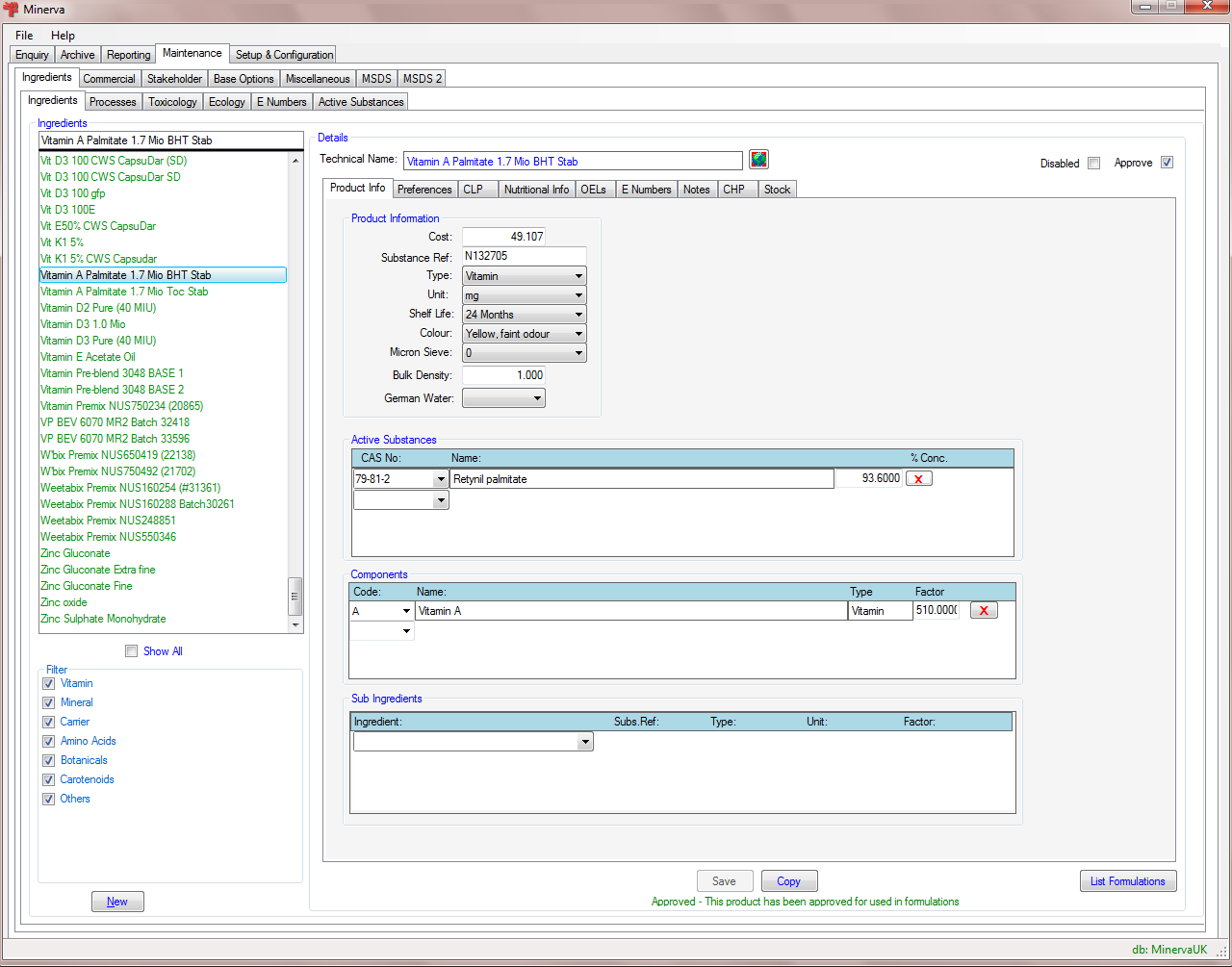
| Field label | Field description |
| Technical Name | The multilingual technical name for the substance |
| Disabled | Tick to disable the substance. You might do this if you no longer want to use the substance. |
| Approve | This allows the substance to be used on a formulation. You would approve the substance when you have entered all of the data required. |
| Product Information area | |
| Cost | What you charge per kilogram for the substance. This can be synchronised with your stock system when the systems are connected. |
| Substance Ref. | Your stock reference code. If the substance is approved and there is no substance reference entered then the substance will be shown in the list like . |
| Type | The type of the substance i.e. Vitamin, Mineral, Carrier etc. |
| Unit | The weight of the substance i.e. kg, gm, mg or ug |
| Shelf Life | The minimum shelf life for the substance. |
| Colour | The colour of the substance. |
| Micron Sieve | The smallest sieve that the substance will pass through. |
| German Water | The class the substance falls into for the German water regulations. |
| Active Substances area. | |
The active substance(s) are shown on the MSDS section 3 and when the formulation is classified as hazardous on section 2. Multiple active substances are classed with the same hazards using the CLP classifications that are entered onto the CLP tab. |
|
| CAS No. | Select the CAS codes for this substance |
| Name | Shows the name of the selected active substance |
| % Conc. | Enter the concentration percentage of the active substance |
| Components area. | |
The generic component(s) or nutrient(s) are used to help select the substance used on a formulation. | |
| Code | The generic component(s)/nutrient(s) this substance is linked to |
| Factor | The stength of the component within this substance |
| Sub-Ingredients area. | |
Sub-Ingredients are ingredients that are used in the premix and have their own CLP classifications these are calculated separately from the main ingredient. We use the factor to work out how much of the sub-ingredient is in the premix, and then use the active substance percentage to calculate the hazards. |
|
| Ingredient | The selected sub-ingredient |
| Factor | The decimal amount of the sub-ingredient in the substance, usually less than one. |
| Buttons | |
| This allows you to create a new substance. If you are going to link an active substance to this substance, create the active substance first. | |
| This button saves all changes made to the substance | |
| This button allows you to copy the substance. You will need to enter a different Technical Name and Substance Ref. When there are values entered for Toxicology, Ecology or OEL you will be able to copy them to the new substance. | |
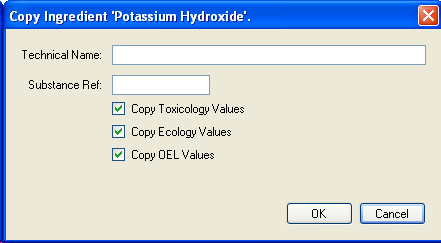 |
|
| Lists all of the formulations that this substance has been used in. | |
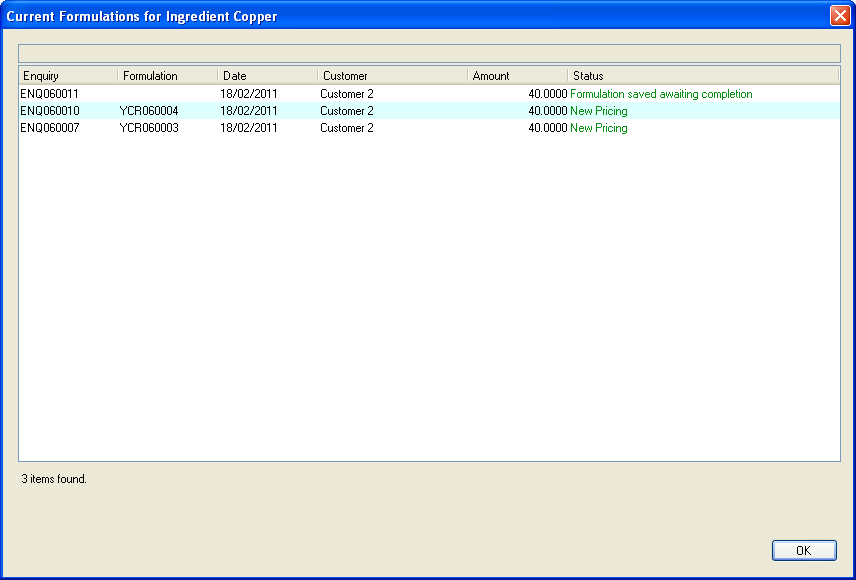 |
|
| What the substance is suitable or not suitable for. | |||||||
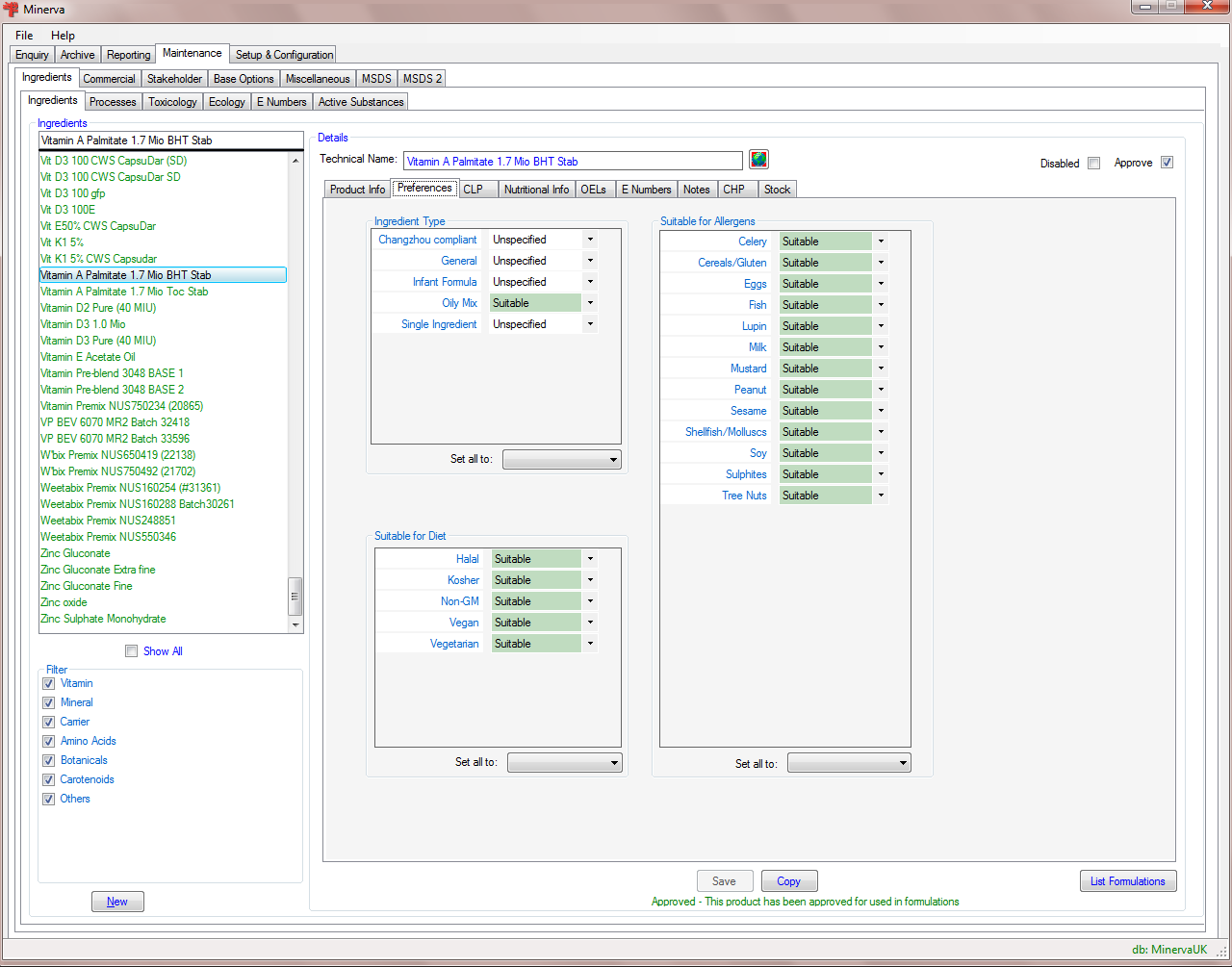 |
|||||||
|
|||||||
On this tab you select the GHS/CLP hazard classes associated with the active substance(s). |
|
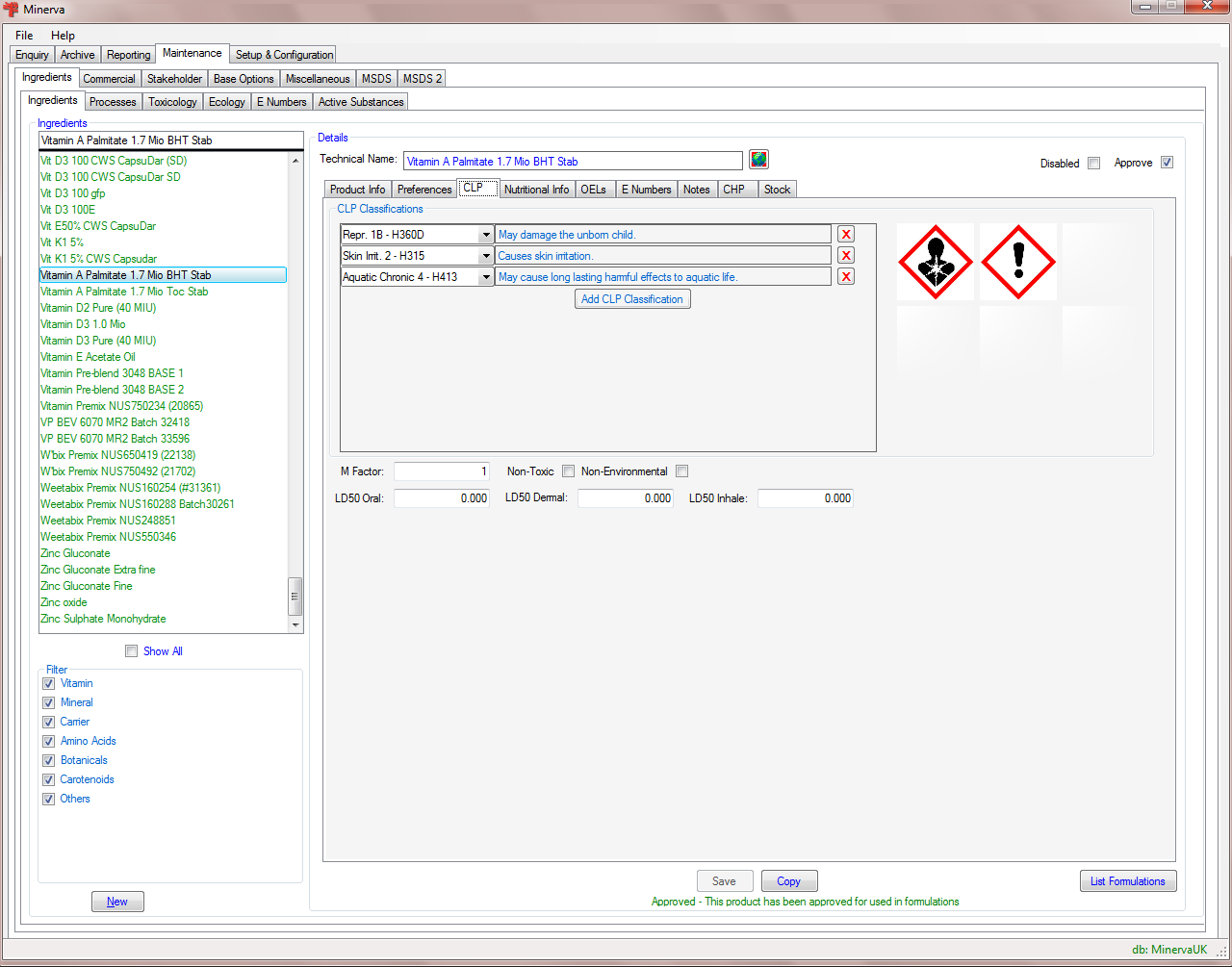
|
|
| CLP Classifications | Select the classification and hazard statement required. You will see the pictograms associated with the classification shown on the right. |
| M Factor | This is the multiplication factor for the aquatic classification, virtually all of the time this is one. |
| Non-Toxic | Tick this option if you know for certain that this substance does not pose an acute threat to human health. |
| Non-Environmental | Tick this option if you know for certain that this substance does not pose a threat to the aquatic environment. |
| LD50 Oral | The LD50 value for any acute oral hazard, this value is based on the value for rats or use the oral ATE value. Without this value we cannot calculate the oral acute toxic hazard. |
| LD50 Dermal | The LD50/ATE value for any acute dermal hazard, this value is based on the value for rats or use the dermal ATE value. Without this value we cannot calculate the dermal acute toxic hazard. |
| LD50 Inhale | The LD50/ATE value for the acute inhalation hazard, this value is based on the value for rats or use the inhalation ATE value. Without this value we cannot calculate the inhalation acute toxic hazard. |
| The nutritional and heavy metal information for the ingredient. | |
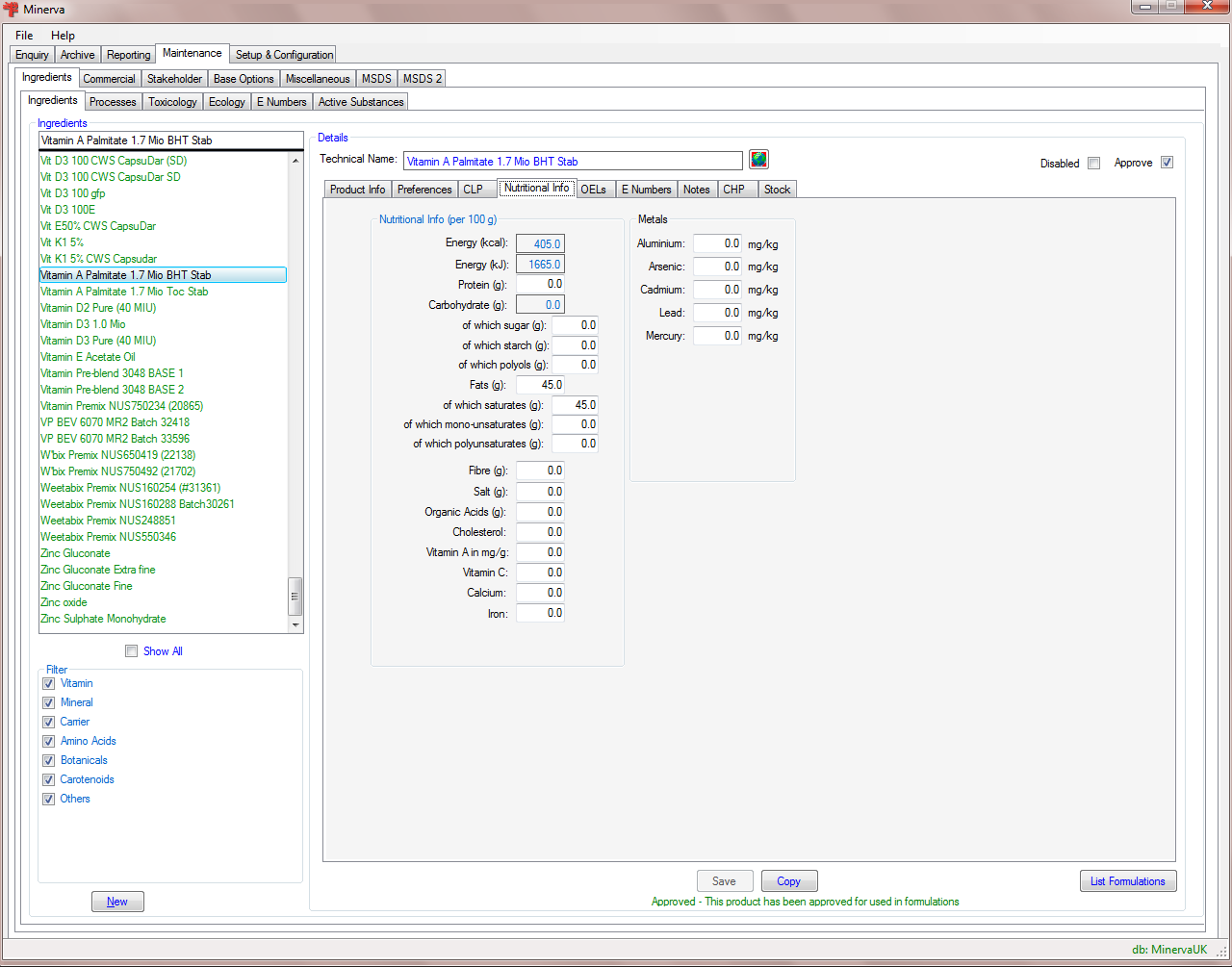 |
|
| Energy (kcal) | Calculated using the values entered below. |
| Energy (kj) | Calculated using the values entered below. |
| Protein (g) | The amount of grams of protein in 100g of the ingredient. |
| Carbohydrate (g) | Calculated using the values entered for the sugar, starch and polyols values. |
| of which sugar (g) | The amount of grams of sugar in 100g of the ingredient |
| of which starch (g) | The amount of starch, in grams, in 100g of the ingredient |
| of which polyols (g) | The amount of polyols, in grams, in 100g of the ingredient |
| Fats (g) | The amount of grams of fat in 100g of the ingredient. |
| of which saturates (g) | The amount of saturate fats included in the Fats value. |
| of which mono-unsaturates (g) | The amount of mono-unsaturate fats included in the Fats value. |
| of which polyunsaturates (g) | The amount of polyunsaturate fats included in the Fats value. |
| Fibre (g) | The number of grams of fibre included in 100g of the ingredient. |
| Salt (g) | The number of grams of salt included in 100g of the ingredient. (This used to be sodium) |
| Organic Acids (g) | The amount of grams of organic acid in 100g of the ingredient. |
| Cholesterol | The amount of Cholesterol in the ingredient. |
| Vitamin A in mg/g | The amount of vitamin A in the ingredient. |
| Vitamin C | The amount of vitamin C in the ingredient. |
| Calcium | The amount of calcium in the ingredient. |
| Iron | The amount of iron contained in the ingredient. |
On the right-hand side there is a list of heavy metals, with the amount measured in miligrams per kilogram. |
|
| Aluminium | Cadmium | Arsenic | Lead | Mercury |
| The Occupational Exposure Limits for the substance | |
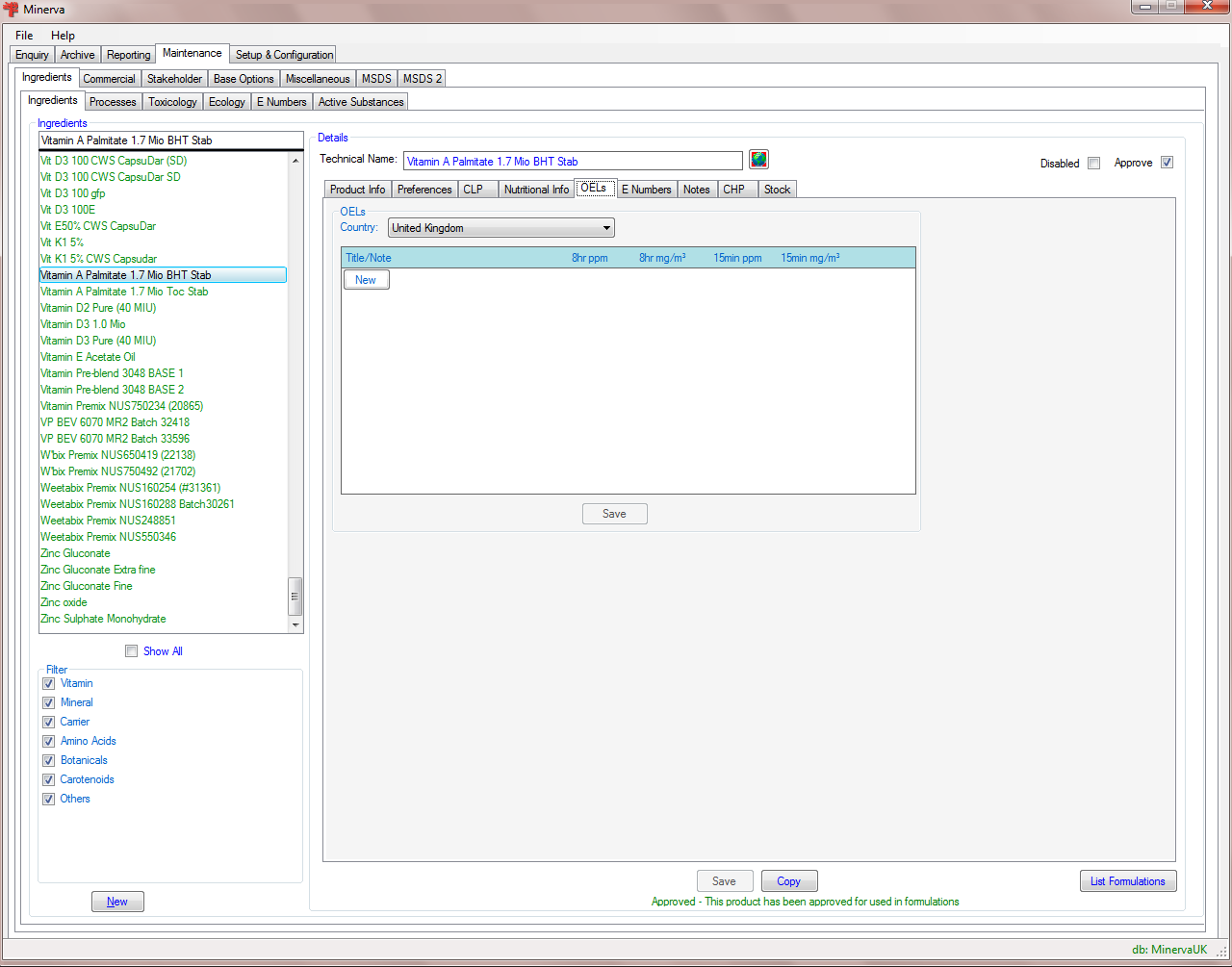 |
|
| Country | The country you want to enter the OEL's for. The country must be flagged in the countries record with the "OEL/RDA values" option. |
If there are no entries or you want to add an entry then press the button. |
|
| Title/Note | The name of the OEL issued by the country. |
| 8hr ppm | The 8 hour parts per million maximum exposure limit value, usually meaning a days shift. |
| 8hr mg/m3 | The 8 hour milligram parts per m3 maximum exposure limit, usually meaning a days shift. |
| 15min ppm | The 15 minutes parts per million maximum exposure limit value. |
| 15min mg/m3 | The 15 minute milligram parts per m3 maximum exposure limit. |
| Remove the selected OEL entry. | |
| Under the above is a text box that you can add notes or other exposure limits. | |
Before you change country or when you finish entering the OEL's, you must press the |
|
| You can link any E-numbers in the substance here. | |
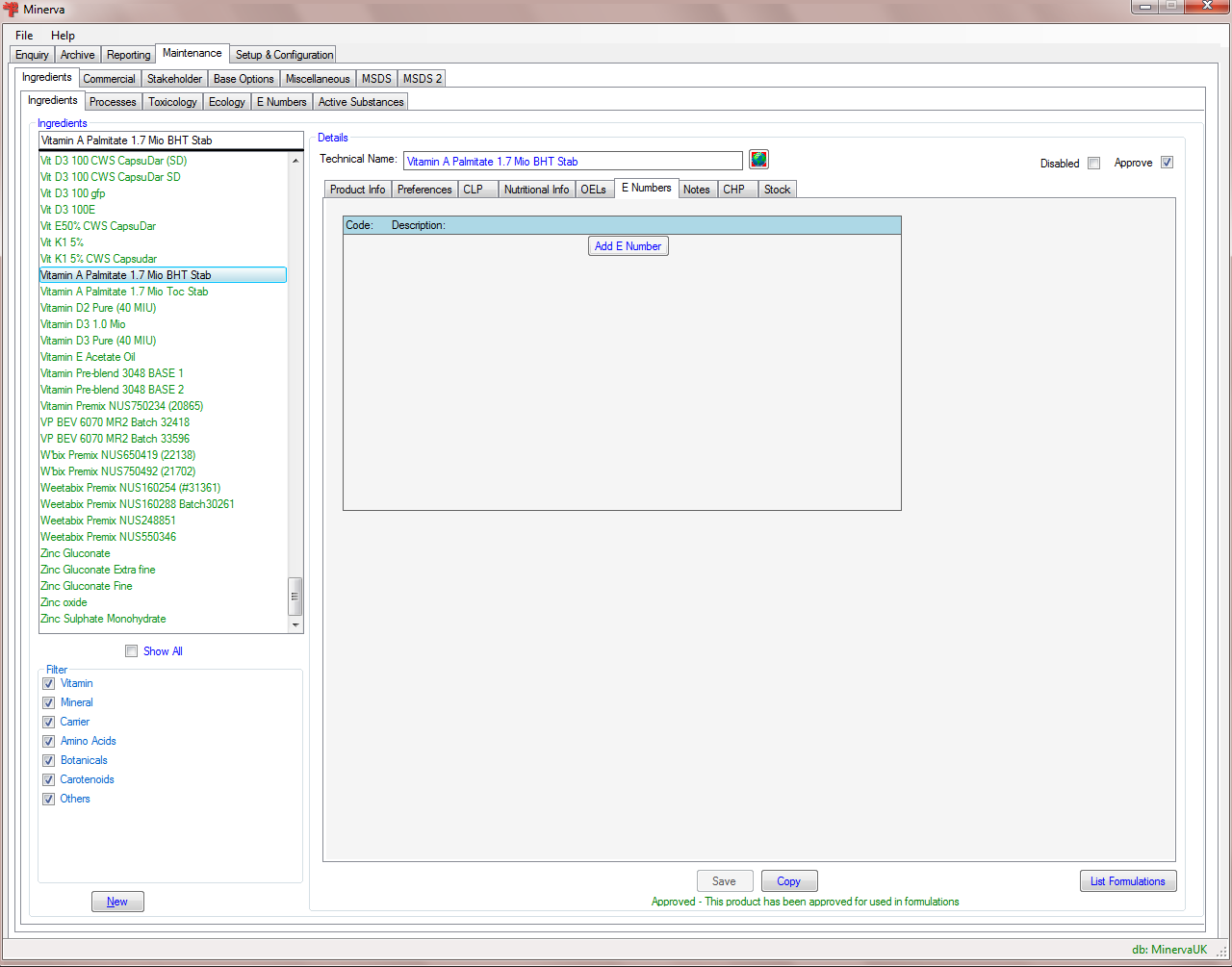 |
|
| To add an e-number click the |
|
| Code | Select the E-Number that you require. |
| Remove the selected E-Number. | |
| Any notes or comments that you want to add about the substance, these are only for your internal use and are not printed. | |
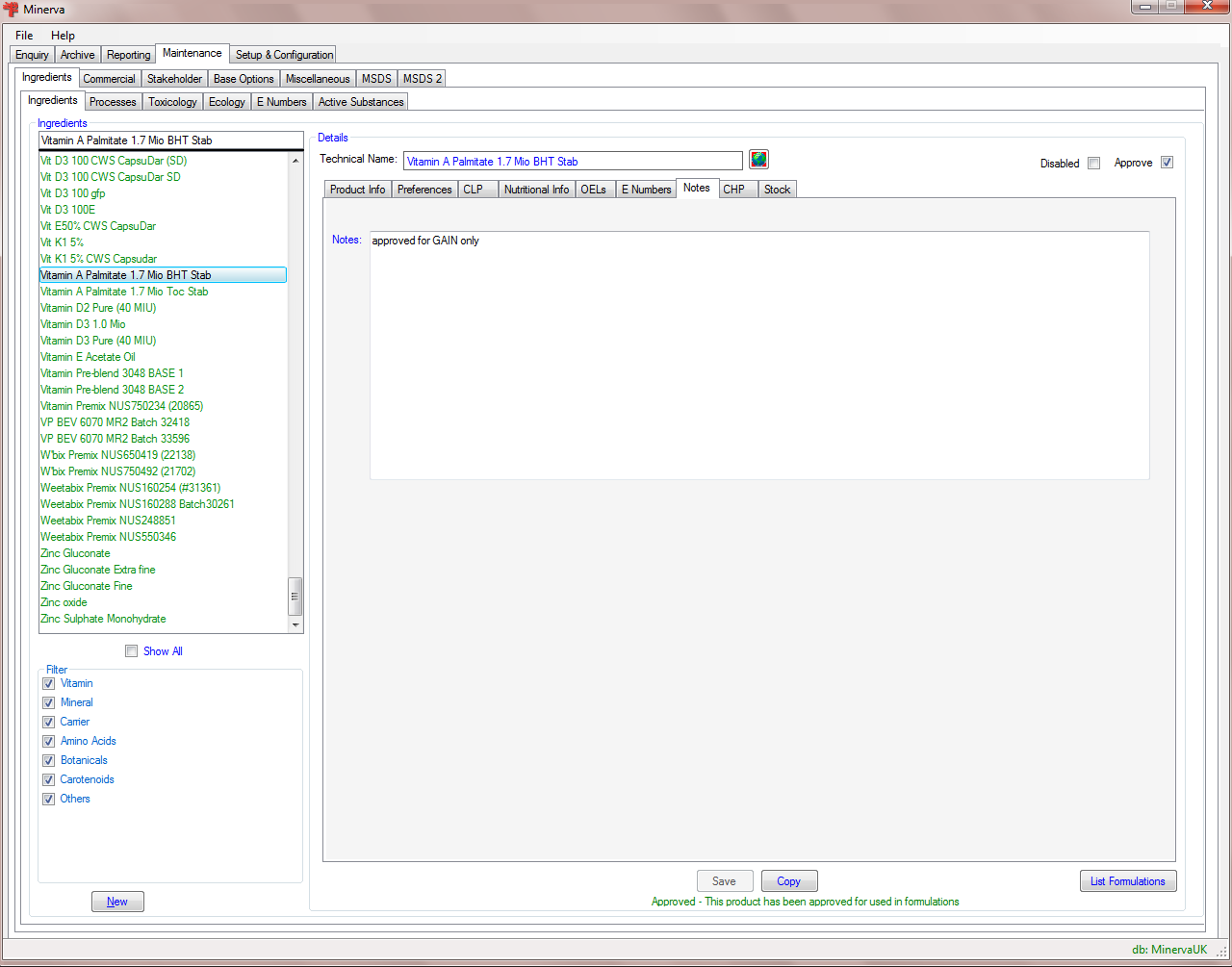 |
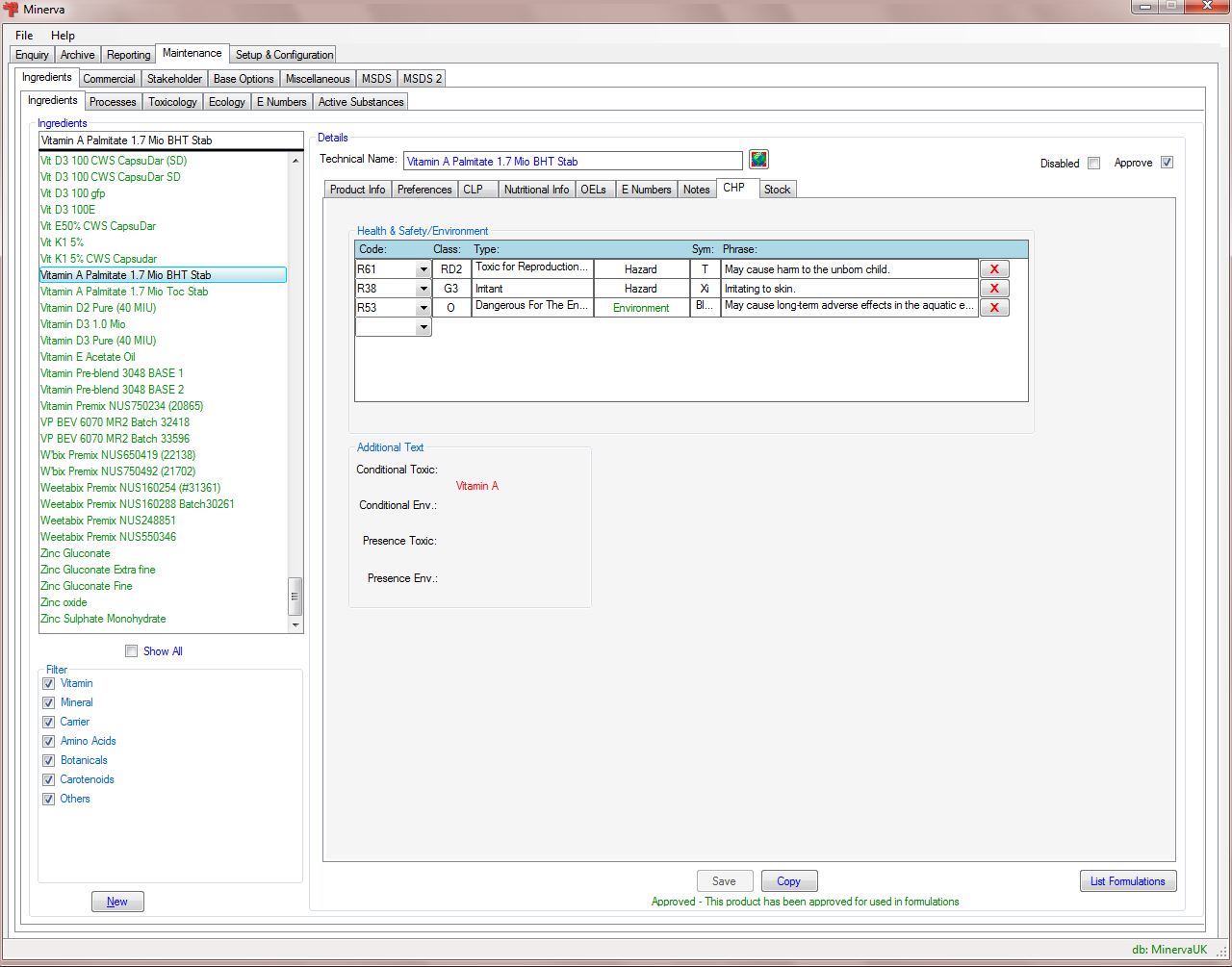 |
|
| Code | Select the R-Phrase required. |
| Remove the selected R-Phrase. | |
| Conditional Toxic | No longer used |
| Conditional Env. | No longer used |
| Presence Toxic. | No longer used |
| Present Env. | No longer used |
| We can link to your stock details for the substance, using the Substance Ref. as the stock code. | |
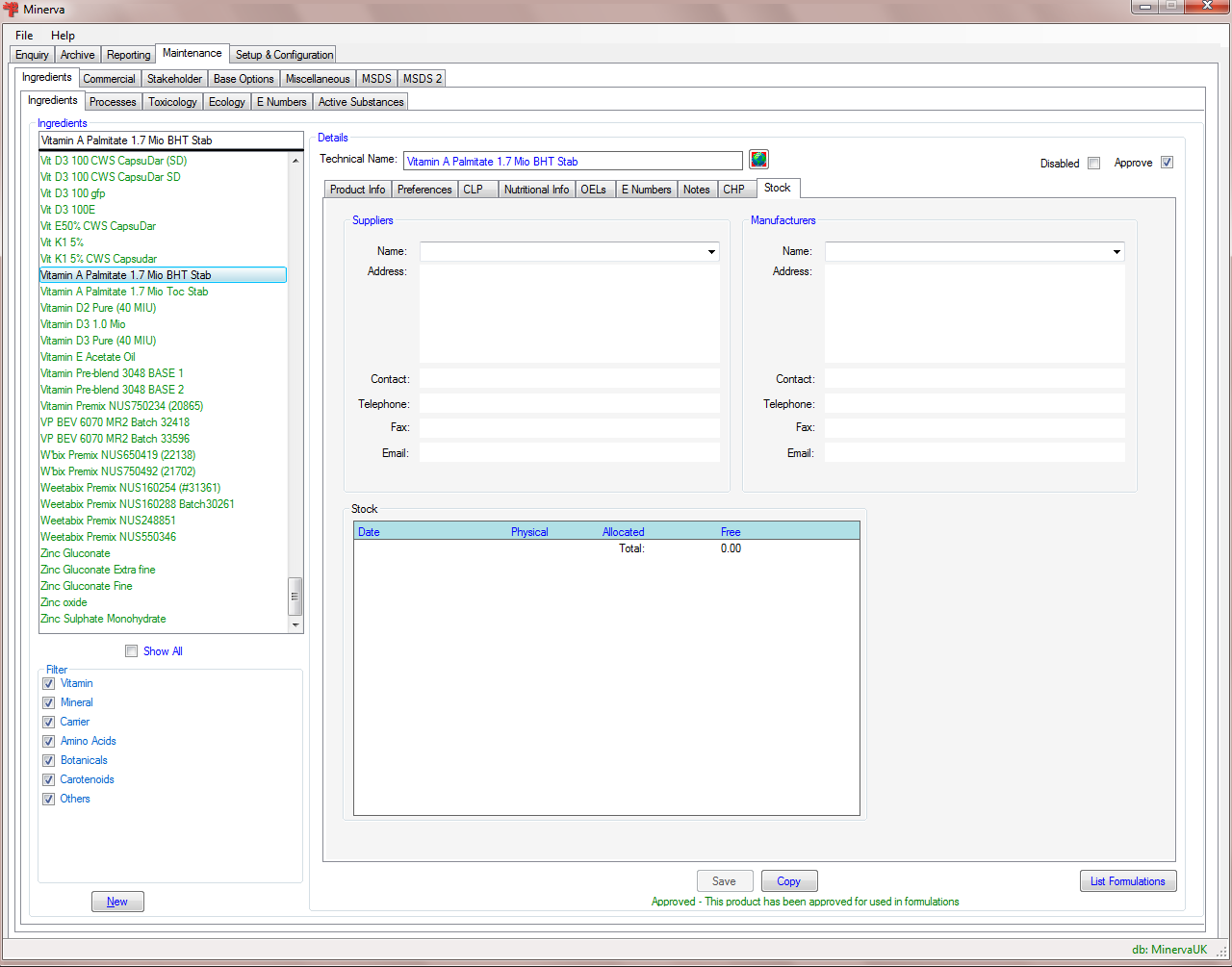 |
|
| Suppliers | Select the supplier for the substance. |
| Manufacturers | Select the manufacturer from the drop-down list for the substance. |
| Stock area | When linked to your stock system this will show available stock. |
|
|